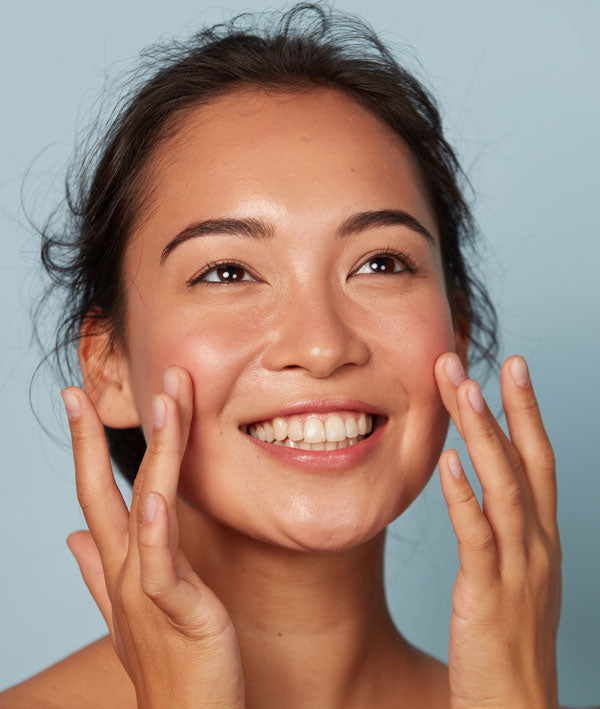Pesky dark spots (also known as hyperpigmentation) can affect just about anyone at any age. They come in the form of age spots (also known as sun spots), melasma, and post-inflammatory hyperpigmentation, the latter of which is caused by acne. While these are caused by different triggers, they all form when a certain area of the skin overproduces melanin – AKA your skin’s natural pigment.
As common of a concern as dark spots are, not everyone knows the best course of action for fading these spots for a more even skin tone. We’re going to talk about the role a well-formulated vitamin C serum can play in targeting hyperpigmentation, as well as what you can expect after adding this ingredient to your skincare routine.
What are Dark Spots?
The term dark spots is used to describe a range of conditions where certain areas of the skin appear darker than the rest. With dark spots, the color can range from light to dark brown, and the texture of the skin will remain the same.
The root cause can vary depending on the condition, but any type of hyperpigmentation forms when the skin responds to a trigger by producing an excess of melanin. There are three primary types of dark spots:
-
Sun Spots: Caused by chronic UV exposure, often found on the face and hands.
-
Post-Inflammatory Hyperpigmentation: Triggered by acne, eczema, or other skin injuries.
-
Melasma: Linked to hormonal changes, most common during pregnancy.
Dark spots are harmless, but many people want to know how to get rid of dark spots on face quickly and effectively. That’s where targeted treatments—particularly vitamin C—play a powerful role.
How Does Vitamin C Serum Brighten Your Skin?
One of the most talked about benefits of topical vitamin C is its ability to brighten the skin for a more radiant complexion. These brightening effects are what help fade the appearance of hyperpigmentation to promote evenness in the skin.
So how exactly does it work? Vitamin C inhibits the activity of tyrosinase, an enzyme responsible for the production of melanin. By slowing down pigment creation, vitamin C for hyperpigmentation not only fades discoloration but also helps prevent new spots from forming.
Consistent use makes the biggest difference. Most people see improvements in tone and clarity within 4–8 weeks of use.
How to Use Vitamin C for Dark Spots
If you want to add vitamin C into your routine to fade discoloration, proper use is key. Apply your serum once or twice daily to freshly cleansed skin, followed by moisturizer and sunscreen in the morning.
For stubborn spots, a vitamin C spot treatment can be layered directly onto problem areas before applying an all-over serum. This targeted approach provides concentrated brightening power exactly where you need it most.
Another essential step? Sun protection. Even the most effective vitamin C dark spots serum won’t be able to undo the damage if new UV exposure continues to trigger melanin production.
How to Get Rid of Dark Spots on Face: A Multi-Step Approach
Vitamin C is a cornerstone ingredient, but for those wondering how to get rid of dark spots on face completely, a combination strategy works best:
-
Daily sunscreen. Prevents existing dark spots from worsening and stops new ones from forming.
-
Exfoliation. Gentle exfoliating acids (like lactic or glycolic acid) remove dead skin cells so vitamin C can penetrate more deeply.
-
Hydration. Keeping the skin barrier strong with moisturizers and ceramides helps reduce irritation and allows treatments to work more effectively.
-
Professional treatments. Dermatologists may recommend chemical peels, microneedling, or laser treatments for severe cases.
Still, vitamin C remains one of the safest and most effective at-home options for brightening and evening tone.
Top Benefits of Vitamin C in Your Skincare Routine
Vitamin C is a powerful dark spot fader, but its benefits go beyond pigmentation:
-
Antioxidant protection: Shields skin from free radical damage caused by pollution and UV exposure.
-
Collagen support: Helps maintain skin firmness and elasticity.
-
Line softening: Reduces the look of fine lines and wrinkles over time.
-
Enhanced glow: Promotes overall radiance and vitality in the skin.
When you combine these benefits with its ability to target hyperpigmentation, it becomes clear why so many dermatologists recommend vitamin C as a daily essential.
Not All Vitamin C Serums Are Created Equal
Practically every skincare company has their own version of a vitamin C serum, but the formula quality can vary greatly. Look for:
-
Proven forms of vitamin C. L-ascorbic acid and 3-0-ethyl ascorbic acid are especially effective.
-
Supporting antioxidants. Ingredients like ferulic acid and vitamin E stabilize vitamin C and boost its results.
-
Protective packaging. Airless pumps or opaque bottles preserve potency.
Our Vitamin C Boost Serum is crafted with three powerful forms of vitamin C, paired with ferulic acid, vitamin E, and hydrating botanicals to deliver targeted results for hyperpigmentation, all while remaining gentle on the skin barrier.
When it comes to fading stubborn discoloration, vitamin C is one of the most science-backed, versatile solutions available. Whether you’re using it as an all-over serum or a vitamin C spot treatment, this ingredient works to brighten, protect, and transform the skin over time.
If you’ve been searching for an answer to how to get rid of dark spots on face, the combination of a high-quality vitamin C serum, diligent sun protection, and consistency is one of the most effective paths forward. And with so many added benefits—like collagen support and antioxidant protection—it’s more than just a dark spot corrector; it’s a true investment in your skin’s long-term health and glow.






